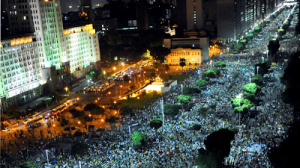Slow progress on the World Cup venues
 Sports Minister Aldo Rebelo says Brazil needs to find a way to speed up the completion of the six stadiums still being built for the 2014 World Cup. Rebelo said Brazil learned from the Confederations Cup that it has to do a better job to guarantee the stadiums are finished by the December deadline established by FIFA. FIFA has said it will not tolerate the kind of delays that afflicted the stadiums used in the Confederations Cup earlier this year. The minister said that only the Sao Paulo stadium that will host the opening match in June next year is comfortably on track to be completed on time.
Sports Minister Aldo Rebelo says Brazil needs to find a way to speed up the completion of the six stadiums still being built for the 2014 World Cup. Rebelo said Brazil learned from the Confederations Cup that it has to do a better job to guarantee the stadiums are finished by the December deadline established by FIFA. FIFA has said it will not tolerate the kind of delays that afflicted the stadiums used in the Confederations Cup earlier this year. The minister said that only the Sao Paulo stadium that will host the opening match in June next year is comfortably on track to be completed on time.
Only two of the six venues needed for the Confederations Cup tournament played in June this year were completed by the initial deadline set by football's governing body.
Four of the stadiums are less than 80% completed — in Curitiba, Manaus, Natal and Porto Alegre. The venue in Cuiaba is 80% ready, according to the sports ministry. FIFA usually wants at least three test events at each venue, but that did not happen in most of the Confederations Cup stadiums because of construction delays.
The sentiments underpinning those disturbances in Brazil
 Looking back on the 9 cent increase in bus fares that set off mass protests, it seemed in part so out of balance when the government was spending some $30 billion on stadiums for the Olympics and the World Cup. William Waack, an anchorman on Brazil’s Globo, probably spoke for many when he observed: “Brazilians don’t feel like their elected representatives at any level actually represent them, especially at a time when most leaders fear the stigma of making actual decisions (otherwise known as leading). … It’s not about the 9 cents.” It's the flat-world, spend-your-life-reinventing-yourself, dog-eat-dog society.”
Looking back on the 9 cent increase in bus fares that set off mass protests, it seemed in part so out of balance when the government was spending some $30 billion on stadiums for the Olympics and the World Cup. William Waack, an anchorman on Brazil’s Globo, probably spoke for many when he observed: “Brazilians don’t feel like their elected representatives at any level actually represent them, especially at a time when most leaders fear the stigma of making actual decisions (otherwise known as leading). … It’s not about the 9 cents.” It's the flat-world, spend-your-life-reinventing-yourself, dog-eat-dog society.”
Reactions to the widespread action over the money being spent on venues, are varied. Many Brazilians see the protests as a healthy sign of a young democracy, and those involved with the World Cup seem happy to latch on to that message. We respect that in any democratic country, everyone has the right of expression," said Mr. Roy of Coca-Cola. "We will wait and watch."Nizan Guanaes, chairman of Grupo ABC, which includes ad agencies DDB Brasil and Africa, said the protests are "the price of democracy," adding that, "the insights coming from the population will help improve our democracy and influence new public policies."
Fox Sports is picking up the football
Brazilian pay-television broadcaster Fox Sports Brasil has announced that it will provide live coverage of all 64 games of the 2014 FIFA World Cup and will launch a second channel next year. The Maquina do Esporte website said that the move is part of a rights-sharing agreement Fox Sports reached with Brazilian media group Globo last year. Under the agreement, Fox Sports gave Globo’s pay-television channel SporTV exclusive rights for certain games from the Copa Libertadores, South American club football’s leading competition, and non-exclusive rights for other games from the same competition. The agreement took effect from the 2013 edition.
The World Cup games will be available on the main Fox Sports channel or the new Fox Sports 2 channel, which is expected to launch in January. Carlos Martinez, president of Fox International Channels Latin America, said that the chance to broadcast Brazil’s home World Cup would represent a strong opportunity to enhance Fox Sports Brasil’s popularity following the service’s launch last year.
“Sustainable Brazil: Socio-economic impacts of the 2014 World Cup”
A study of substantial insight and value has been produced by a partnership between Ernst & Young and FGV Projetos, analysing and detailing issues and presenting impacts that the 2014 World Cup will have on Brazil. The study highlights the benefits and the legacy the World Cup might bring to the country, as well as the risks to be faced by the public and corporate sectors in bringing the event to reality. FGV Projetos is a technical assistance unit of FGV Foundation that extends its education and research activities into practical applications, based on the academic learning and expertise acquired and developed at ten leading Brazilian schools and institutes of law, economics and business.
The full report is available on the web, just click here for access.
Will tourism generate a bonanza?
The tourism legacy has always been a tricky one, prone to so many external and non-event related influences. South Africa benefited from the 2010 World Cup through some increment in tourism, but frankly, not to any great extent.
Embratur, Brazil's state tourism agency, expects tourism during the 2014 World Cup to generate around $10.9 billion in economic activity. Brazilian fans are forecast to spend almost $8 billion on accommodation, food and travel, with foreigners spending another $3 billion inside Brazil.The finals of the football tournament, scheduled for 12 June to 13 July 2014, are expected to draw 600,000 foreign visitors.
Embratur expects 3 million Brazilians to travel within the country to attend matches in the 12 cities/venues around the country.
A recent Embratur report said that the Confederations Cup, staged in June as a warm-up event a year ahead of the World Cup, brought Brazil an estimated $140 million in tourism spending.
From different quarters a new row is looming – over hotel prices during the World Cup. Hotel rates in a number of host cities are between 200% and 350% higher than normal during the competition. In Salvador, increases of as much as 600% are proposed.
2014 World Cup Seminar: Sustainability and Legacy
Host City of Manaus, the capital of Amazonas state, was the location for a seminar on World Cup sustainability and legacy – a forum for exchanging views and identifying solutions for the 12 host cities.
The event was promoted by the Brazilian ministries of Sport and the Environment, the Inter-American Development Bank, the Amazonas state government and Manaus City Council.
FIFA’s Head of Corporate Social Responsibility Federico Addiechi presented on “The World Cup as an Opportunity for Social Mobility and Changing Values.
Day one of the seminar featured valuable contributions from the likes of World Cup Workshop Coordinator Joel Benin, appearing on behalf of the Brazilian Minister for Sport Orlando Silva, and Denise Hamu, the representative of the United Nations Environment Programme in Brazil. Discussion included how the issue of sustainability has been tackled at other major events. Invited participants included David Noemi, who sat on the FIFA Women’s World Cup Germany 2011 Local Organising Committee; Brett Herron, a Cape Town city councillor; and Korea Republic ambassador Bok-Hyung Lee, a member of the FIFA World Cup Korea/Japan 2002 LOC. They spoke of the legacies they helped to create, legacies that will endure long after competition has ended, which is exactly what Brazil 2014 is hoping to achieve.
Day two centred on the possible resources and solutions for implementing a sustainable FIFA World Cup project. The round table “Innovative Solutions for Host Cities” discussed sustainable urban mobility and recycling, and there was debate around the central theme: “The World Cup as an Opportunity for Sustainable Development in the Host Cities”.
Money trickles away…
The Brazilian Football Federation (CBF) may lose half of its 2012 profit following the collapse of Belo Horizonte-based Banco Rural, a bank at the centre of a government corruption scandal. About $13 million were involved in the charges relating to money laundering and mismanagement. Officials from Brazil’s ruling Workers’ Party were found guilty by the Supreme Court of using embezzled public funds and fraudulent loans from Rural to buy votes in the Congress from 2003 to 2005.
However, Brazilian football’s governing body is said to carry out the majority of its banking with commercial partner Banco Itau.
Rio doping labs suspended
In a new embarrassment for Brazil’s international sport fraternity and for the leadership of the Brazil Olympic Committee, the Rio 2016 Olympics organisers and the World Cup agencies, the UFRJ Doping Control Laboratory in Rio de Janeiro has been suspended by WADA, the World Anti-Doping Agency.
The suspension, effective from 8 August, prohibits the LADETEC from carrying out any WADA-related anti-doping activities. Officials can appeal to the Court of Arbitration for Sport until 29 August.
This action adds to widespread concern over Brazil’s competence in its preparations for both the 2014 World Cup finals and the 2016 Rio Olympic and Paralympic Games.
The latest edition of “Back on the Block”, talking about the Business of events, is available at http://eepurl.com/D88TL






